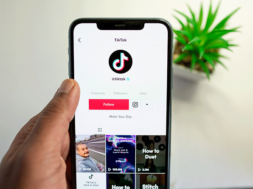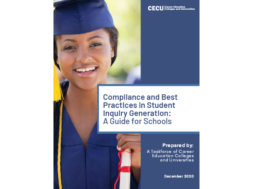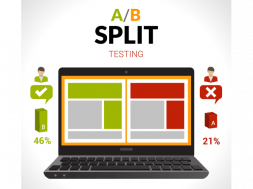
Authenticity, Privacy, Student-Centered Content are the Key to Successful Enrollment Growth
By Eric McGee, Director of Marketing & Corporate Communications, EducationDynamics
Higher Education has weathered serious change over the last decade. We’ve seen the student demographics change to post-traditional students who are generally older, already employed, and careful with their spending choices. Meanwhile, consumer confidence in higher education has fallen and institutions must work harder to earn trust. Throughout all of this, more and more universities have begun to compete for non-traditional adult students.
If you rely on just one concept to guide your marketing in 2020, it should be authenticity.
Transparently communicating the messages that matter to your prospective students will be key for higher education marketers and enrollment management practitioners. Your messaging should be clear and up-front about important factors like your brand promise, personal and career outcomes, and even pricing – especially pricing. Student-centered storytelling, personalization, and protecting your prospect’s privacy can help you build trust, grow confidence, and increase your enrollments with authentic storytelling.
Higher education is facing a crisis of trust. Students wonder if post-secondary education is still a good investment and whether the rewards justify the cost. To build trust, you’ll need to rely on authentic storytelling more than ever. That means having a clear, authentic message on which to base your story. Most importantly, effective storytelling in marketing means you focus your story and your message around the student. The student becomes the hero in every story you tell.
So much of higher education marketing and messaging focuses on the program’s features – great faculty, world-class facilities, high-quality students, and the list goes on. While those features may (or may not) be of value to your prospective students, it is not what they care most about. What your prospective students care about, and want to hear from you, is how those features are going to translate into tangible benefits that get them closer to their goal.
Remember that a student’s goal is almost certainly not to “earn a degree” or “gain a certification.” Your students have goals that are much more personal and tangible to them – goals that are going to significantly impact their life. Non-traditional adult students are seeking real change in their lives through career opportunities, personal achievement, or both. About 66% of post-traditional college students, the largest cohort of students today, enroll in college for career-related reasons. They want a whole new career, a promotion, or a new job to help them build a better life. Your marketing message should speak to that desire.
Connect the dots for students so they can see how enrolling in your institution helps them meet their goals. Focus on outcomes – their outcomes. At the same time, make sure that every story you tell fits your authentic voice and the brand promise of your institution. You should be able to point to a single throughline message from which all your marketing grows.
Consumers today have a finely tuned sense for marketing fluff. When they see it, they scroll right past. Create content that delivers real value and answers the important questions.
Your brand story is about how you help students accomplish their goals. The student should always be the focus. Your task is to show how you helped, supported, and guided that student to their desired destination.
Student-centered stories mean making the individual student the hero. While many students will share certain goals, aspirations, and desires, their stories aren’t all the same.
Personalization through technology and marketing automation is an effective way to maintain authenticity and grow trust with every student.
Personalization is a trend across all marketing segments, not just higher education. If anything, higher education is behind the curve. The general public’s frustration over the number of marketing messages they receive every day, many of which are irrelevant, means that mass marketing is losing its appeal.
In a survey of retail shoppers, 86% of consumers who have experienced personalization say it influences their purchasing decisions. Higher education isn’t retail, but it’s safe to say that consumers want personalization, regardless of the reason behind the message.
Not too long ago, “personalizing” your marketing messages just meant calling the student by name in your emails. These days it’s a lot more sophisticated. It has to be because more and more leads are tuning out messages that don’t feel personal.
How do you personalize marketing content without crafting something unique for every lead? The solution is mass customization. Adjust your messaging, cadence, and platform based on the behavior of the prospect. Of course, doing so requires data and marketing automation technology that can respond automatically or notify you in real time.
These are some examples of behaviors that might trigger a personalized response:
- A lead who visits an application page but doesn’t fill out an application might trigger a call from an advisor to find out what’s preventing them from taking the next step.
- A student who visits several blog posts about paying for college might trigger an automatic email that sends them a link to your interactive financial calculator.
- A web visitor who clicks through several pages of your site might trigger a retargeting ad to entice them to engage with new pages or content.
Tap into marketing automation and personalization to deliver messages to your prospective students at the right time and in alignment with their actions and behaviors. Not only will this approach improve the effectiveness of your mass marketing messages, but it will also provide valuable insights and data points for your recruiting and advising teams. When you deliver messages and have personal conversations that speak directly to the individual’s concerns, goals, and objections, you are building relationships that are authentic and earn you trust.
Perhaps nothing will kill trust in a brand like privacy breaches and violations. Consumer privacy arose as a major concern in the last few years due to several high-profile data security breaches involving major brands like Target, Marriott, and Equifax. Higher education institutions are prime targets for security attacks precisely because of the massive amount of data they hold. Your prospective, current, and former students want to know their data is safe and that you care about protecting their privacy.
The introduction of GDPR forced anyone with a web presence to closely examine how they managed data. But, GDPR was just the start. The California Consumer Privacy Act (CCPA) goes into effect in 2020, giving consumers power over how their data is being used, what it is being used for, and how brands communicate with them. CCPA is one of the broadest-reaching legal efforts to protect consumer privacy. CCPA sets up guidelines for handling personal data, which may include biometrics, family info, location, finances, etc.
More privacy acts and legislation are sure to follow.
While CCPA covers only California residents, its introduction is likely the beginning of a trend toward privacy protection across the country.
Several states have already introduced their own version of CCPA.
If your institution is already compliant with GDPR, you are probably well-prepared for CCPA. But privacy is a growing concern, one you should take seriously. Look beyond your institution’s website at the vendors and third-party service providers who store or process your data. If your institution is a non-profit, you may be exempt from CCPA, but your vendors are not.
If a data breach happens or students feel their data is being used irresponsibly, it’s not the vendor they will blame. It’s you. You are the one they’re interacting with, so you are the one who needs to earn and keep their trust.
CCPA’s biggest effect on marketers is the provision that you must delete consumer data if they ask you to. That means if you sound spammy, untrustworthy, or irrelevant, potential students can ask you to stop contacting them and remove all their information from your records. Your web copy, blog posts, videos, and other online content becomes a vital way to keep the dialogue open. Every marketing message must prove to potential students that they can trust you.
How to build trust with potential students:
1. Communicate clearly
Make a transparent statement about how you protect applicant privacy. Be prepared to answer if a website visitor asks how their data is being used.
2. Stay informed
Pay attention to the latest privacy rules. CCPA is just the beginning. Other states are already following where CCPA and GDPR have led. A good rule of thumb is to always strive to meet the most stringent privacy standards of the day. Doing so will protect your institution and help you build good relationships with prospective students.
3. Give value
Get to know your potential applicants and prove your value to them so that they opt-in to your marketing messages. Every communication should authentically embody your brand promise while delivering what the potential student needs.
4. Make it a priority
Check that everyone in your organization understands the importance of data privacy. Pay special attention to front-line enrollment counselors and marketing professionals. Without guidance, they may focus so closely on meeting immediate goals that they lose sight of privacy.
5. Practice list hygiene
While this may not sound like a privacy issue, it is. Poor list management can increase complaints and negatively impact your organization’s reputation. Respect the individual’s wishes and honor privacy requests as promptly as possible. Take it a step further and stop emailing prospects who don’t engage. Put your effort and focus on the members of your community who are most interested in hearing from you.
In short, students, and the public in general, are calling for more transparency in higher education. Clearly communicating how you use and protect student data is a powerful first step toward building trust.
The keyword for 2020 is authenticity. Everything you do in your marketing should strive to be authentic, transparent, and trustworthy. From your brand story to consumer privacy concerns to interactive content, your marketing will only work if you have an authentic voice and a clear message. While technology is fundamentally changing the way we attract and recruit prospective students, higher education marketing is, as it has always been, about people. Your focus should always be on the prospective student. Everything you do, every piece of content you publish, every privacy safeguard you enact, is for the student. When you act for the person, you build trust. And people who trust you will be eager to enroll at your institution.
ERIC MCGEE is the Director of Marketing and Corporate Communications for EducationDynamics. Eric has worked in higher education for over 10 years, previously serving as the Director of Continuing Education at the University of South Carolina before focusing his efforts on higher education consulting and marketing. A certified marketing automation expert, he is the administrator and lead architect of EducationDynamics’ marketing automation efforts for Enrollment Management clients. Eric is a graduate of Western Michigan University and the University of South Carolina.
Contact Information:Eric McGee // Director of Marketing & Corporate Communications // EducationDynamics // 561-912-1858 // emcgee@educationdynamics.com // EducationDynamics.com // linkedin.com/in/ericmcgee/











